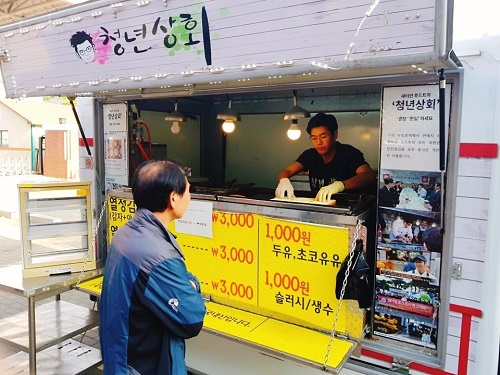
Park Yong Ho is the 27-year-old owner of a food truck that sells toasted sandwiches in Gwacheon, Gyeonggi Province. Park defected from North Korea in 2002 and has continued to face challenges during his time in South Korea. Most recently, his business took significant losses following the outbreak of avian influenza this past August, causing customers to avoid egg products – a primary ingredient in his toasted sandwiches. Although he took great care in sourcing safe products, clients continued to stay away.
“A large carton of eggs that usually costs 2,500 won suddenly became 8,000 won, and then 15,000 won as the crisis went on,” Park explained, adding that it has been difficult to pay his business taxes and living expenses for the past two months. Just two years after starting his business, Park is hoping to overcome the recent crisis.
Gaining practical experience
Park decided from an early age to someday become his own boss. He knew that as an entrepreneur, he would need to study business and marketing. Park finally made these dreams a reality when he entered Sogang University’s Business Administration department.
But the curriculum ended up being quite different to what he had expected. Instead of learning the intricacies of how to run a small business or studying the mistakes of failed business plans as he had hoped, the courses mainly focused on successful mega corporations.
To gain experience, Park began working a series of part-time jobs near his school, sometimes as many as 3 or 4 at a time. He gladly took on new responsibilities, and his managers responded positively by offering him hourly wages 1,000-2,000 won above his coworkers. On top of all of this, he also took on private tutoring, teaching language and math to middle school students. Park worked almost every part-time job available to a university student during those years.
He then pursued a full-time office job with a construction company in order to supplement what he had learned in school with real-world experience. Frequent mandatory company dinners, late nights in the office, conflicts with his boss – Park experienced all of the hardships of work in Korea.
“I don’t do very well in that kind of job, but I definitely put everything I have into something when it really catches my interest. I believe that there are a lot of people in the world coming up with great ideas, but most of them don’t actually materialize. The most important thing is bringing those ideas to life,” Park said, stressing the need for an individual to first recognize their own true skills and limits.
Dreams of owning a food truck
Park’s broad range of work experience eventually led him to start his own business. But this doesn’t mean that his days have gotten any easier. Last year, while still juggling school along with his new business, he would typically wake before sunrise to prepare for class, then go straight from school to open up his food truck and work until around midnight. After closing, he had to go to the market to purchase vegetables and other materials for the next day, and prepare them as well.
Considering that he uses anywhere from 900-1,200 eggs per day, along with large amounts of cabbage, carrots, corn, and other veggies, he is sometimes up until 4:00 or 5:00 in the morning preparing ingredients. A few hours of sleep later and Park is up at 7:00 getting ready for his long commute to school. Despite this exhausting schedule, Park seems to be enjoying his life and the opportunity to interact with people through his food truck.
Park says that he has learned that one must make sacrifices and work hard in order to succeed in South Korean society, especially as a North Korean defector. He believes that defectors must start by being punctual and observing societal norms in their daily lives, from which they can successfully progress to assimilating into the work environment.
Pointing to the dedication with which South Korean students pursue success in English tests and in achieving their dream job, Park believes North Korean defectors stand the same chance of success if they put in the work.
“Though not all 30,000 defectors can contribute directly, I think that promoting the idea of our presence here as a kind of micro unification can go a long way towards creating a positive environment that will improve assimilation, encourage the success of defectors, and lay the groundwork for real unification.”
Park acknowledges that his line of business comes with its challenges, easily affected by seasonal prices or economic conditions, for example. He nevertheless plans to continue his business and even expand to a second and third truck, targeting neighborhoods where he can perhaps earn more money. Having achieved his first dream, Park has set his sights on growing his business into an empire rivaling the famous Paik Jong Won of Paik’s Coffee. In the meantime, he plans to put in the daily work he knows is required to get there.

※This article was made possible in part from funding by the Korea Press Foundation

















